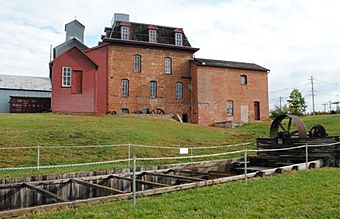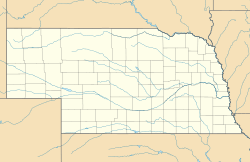Neligh Mill facts for kids
Quick facts for kids |
|
|
Neligh Mill State Historic Site
|
|

Neligh Mill, with flume in foreground
|
|
| Location | N Street at Wylie Drive, Neligh, Nebraska |
|---|---|
| Built | 1873 |
| NRHP reference No. | 69000128 |
The Neligh Mill is a historic flour mill in Neligh, Nebraska. It used the power of water from the Elkhorn River to grind grain. John Neligh, who founded the city, built the mill in 1873. It worked for almost 100 years, closing in 1969.
Today, the Nebraska State Historical Society takes care of the mill. They say it is the only 19th-century mill in Nebraska that still has all its original machines. The Neligh Mill is an important landmark. It is listed on the National Register of Historic Places.
Contents
Neligh Mill: A Look Back at History
The Neligh Mill was built by John D. Neligh, the founder of the town of Neligh. He started building the brick mill next to the Elkhorn River in 1873. Another local businessman, W. C. Gallaway, finished the project. This included building a dam on the Elkhorn River to control the water.
How the Mill Worked: Water Power
A special machine called a water turbine was placed in the mill's basement. This turbine used the river's water flow to power the gears. On August 29, 1874, the mill started working. It ground wheat, corn, and buckwheat into flour and meal.
Modern Changes and Electricity
In 1886, the mill got an upgrade. It switched from using large stone grinding wheels, called mill burrs, to newer steel rollers. These rollers helped make flour more efficiently. The mill provided flour and meal to people all over Nebraska. It even supplied the War Department and the Indian Bureau.
Later, the mill's turbines were improved. This allowed them to create electricity for the town of Neligh. The mill supplied power to the town until 1925.
Visiting the Neligh Mill Museum Today
The Neligh Mill is now a museum. The Nebraska Historical Society runs it. The museum teaches visitors about how important flour mills were to Nebraska and the American West.
What You Can See at the Museum
You can explore exhibits about the mill's operations and its history. These are located in the original warehouse, built in 1866. There is also a 1915 addition where the power plant used to be. The Society has also restored the mill's office building. It looks just like it did with its original furniture.
The Reconstructed Flume
A flume is a channel that carries water. The museum rebuilt the 1919 flume to the south of the mill. You can still see parts of the old dam on the Elkhorn River. This dam collected water for the mill.
Gallery
 | James B. Knighten |
 | Azellia White |
 | Willa Brown |







